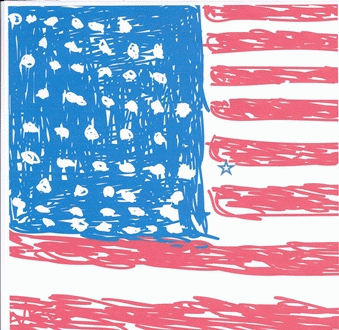(Article changed on May 27, 2013 at 11:54)
.My Flag. by Marta Steele
.My Flag. by Marta Steele
Back in third grade, when we kids used to sing songs without
thinking much about the words, we were taught one song called "What Shall We Do
for Memorial Day?" It ends, "God bless our heroic dead."
I just sang along. Would God hearken to us and bless those fallen
patriots? Just American ones? The song suggests red, white, and blue flowers,
so evidently so. We always pronounced "an iris, too" as "irish stew," which
could, but didn't imply that other patriots, whether enemy or ally, probably
deserved similar homage.
What SHALL we do for Memorial Day to make a difference,
whether or not the dead consciously receive our homage? Eliminate the source of
hideous PTSD and the hideous deaths that cause it? Well, of course.
So we should honor Memorial Day by seeking peace.
But people have been doing this since time immemorial,
though one wonders about the really ancient chronicles of war--those condoned by
God in the Old Testament and even older ones--made-up chronicles of ancient
kings' outstanding victories on battlefields. Those who stayed home were
chicken. Wait a minute. Both Odysseus and Achilles tried to avoid conscription
into the Trojan War, one by cross-dressing, I believe. But once there, you had
to partake of blood and guts either by killing or falling, and each was
described by Homer in rapturous detail.
But each victim's past and lineage were also described with
rustic, nostalgic detail, invoking the tears that adorned the leafy trees of
their homelands and the grief of families left behind, for example. So clearly
the Poet had mixed feelings and I call the "Iliad" the greatest antiwar poet of
all time, not because he championed peace or heroic values per se, but because
he portrayed all sides of the issue in lurid detail, triumph and tragedy
simultaneously. "Why follow Agamemnon, king of another place, to avenge his
brother's domestic problems?" asked more than one hero. "Why miss the joy of
watching my son come of age and why not be there to teach him what's right
[heroic values?]?
So the question remains how to wage eternal peace. The
Messiah may or may not come, and now would be a perfect venue for his arrival,
as would any that involved war. There are amazing, isolated stories where peace
prevailed, but they stand out in history. "Blessed are the peacemakers, for
they will be called children of God." Not always. Tom Paine inveighed against
the Quakers for their pacifism during the American Revolution.
I must be so predictable, ending so many of my articles with
"How?" and so I won't this time, leaving the impossible answers to my readers.
This Memorial Day, I will answer my own question the way my
twelfth-grade history teacher answered my question, Down South no less, about
how to eliminate racism.
"Marta," she said, "one night there has to be a rain over
all the Earth, and when we wake up, we'll all be gray."
Good answer, Miss Prim. Truly a wonderful teacher. But can
this answer apply to peace? It can reign, when it does, but can it rain over
us?
Try again. This is important. Though many would disagree, I
believe, the best way to honor our heroic dead is to eliminate the equation
between heroism and blood&guts.
We're all God's children, blessed Jesus, as the Bible
elsewhere tells us. 1 John, for instance, has " Dear
friends, now we are children
of God . . ."
If this is becoming tiresome, you may stop reading here, because my
conclusion probably won't satisfy you all, because even on OEN it's impossible
to preach to such a diverse choir.
Peace starts within us all. But peace meaning not only the absence of war
but the absence of war as a permanent solution. I've suggested before that
evolution to a higher level is an answer. Human nature is fifty-fifty, and that's
that.
(Note: You can view every article as one long page if you sign up as an Advocate Member, or higher).






